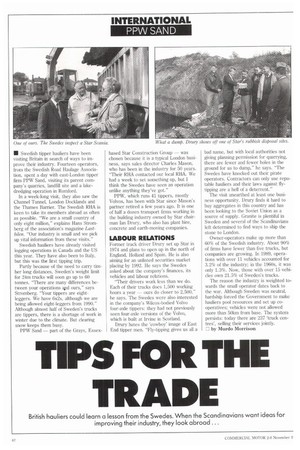INTERNATIONAL PPW SAND
Page 42

If you've noticed an error in this article please click here to report it so we can fix it.
• Swedish tipper hauliers have been visiting Britain in search of ways to improve their industry. Fourteen operators, from the Swedish Road Haulage Association, spent a day with east-London tipper firm PPW Sand, visiting its parent company's quarries, landfill site and a lakedredging operation in Romford.
In a week-long visit, they also saw the Channel Tunnel, London Docklands and the Thames Barrier. The Swedish RHA is keen to take its members abroad as often as possible. "We are a small country of only eight million," explains Hans Stromberg of the association's magazine Lastbilen. "Our industry is small and we pick up vital information from these visits."
Swedish hauliers have already visited logging operations in Canada and the US this year. They have also been to Italy, but this was the first tipping trip.
Partly because of the need to carry timber long distances, Sweden's weight limit for 24m trucks will soon go up to 60 tonnes. "There are many differences between your operations ajid ours," says Stromberg. "Your tippers are eightleggers. We have 6x2s, although we are being allowed eight-leggers from 1990." Although almost half of Sweden's trucks are tippers, there is a shortage of work in winter due to the climate. But clearing snow keeps them busy.
PPW Sand — part of the Grays, Essex based Star Construction Group — was chosen because it is a typical London business, says sales director Charles Mason, who has been in the industry for 50 years. "Their RHA contacted our local RHA. We had a week to set something up, but I think the Swedes have seen an operation unlike anything they've got."
PPW, which runs 41 tippers, mostly Volvos, has been with Star since Mason's partner retired a few years ago. It is one of half a dozen transport firms working in the building industry owned by Star chairman Ian Drury, who also has plant hire, concrete and earth-moving companies.
Former truck driver Drury set up Star in 1974 and plans to open up in the north of England, Holland and Spain. He is also aiming for an unlisted securities market placing by 1992. He says the Swedes asked about the company's finances, its vehicles and labour relations.
"Their drivers work less than we do. Each of their trucks does 1,500 working hours a year — ours do closer to 2,500," he says. The Swedes were also interested in the company's Wilcox-bodied Volvo four-axle tippers: they had not previously seen four-axle versions of the Volvo, which is built at Irvine in Scotland.
Drury hates the 'cowboy' image of East End tipper men, "Fly-tipping gives us all a bad name, but with local authorities not giving planning permission for quarrying, there are fewer and fewer holes in the ground for us to dump," he says. "The Swedes have knocked out their pirate operators. Contractors can only use reputable hauliers and their laws against flytipping are a hell of a deterrent."
The visit unearthed at least one business opportunity. Drury finds it hard to buy aggregates in this country and has been looking to the Soviet Union as a source of supply. Granite is plentiful in Sweden and several of the Scandinavians left determined to find ways to ship the stone to London.
Owner-operators make up more than 60% of the Swedish industry. About 90% of firms have fewer than five trucks, hut companies are growing. In 1989, operations with over 11 vehicles accounted for 3.2% of the industry; in the 1960s, it was only 1.3%. Now, those with over 15 vehicles own 21.5% of Sweden's trucks.
The reason the industry is weighted towards the small operator dates back to the war. Although Sweden was neutral, hardship forced the Government to make hauliers pool resources and set up cooperatives; vehicles were not allowed more than 50km from base. The system persists: today there are 237 'truck centres', selling their services jointly. E by Murdo Morrison


























































































































































